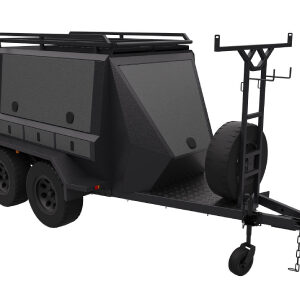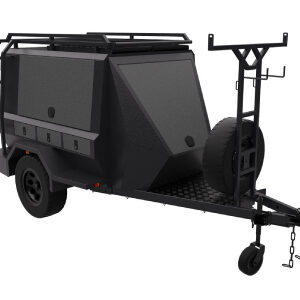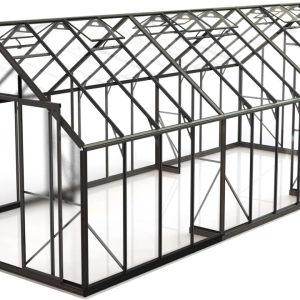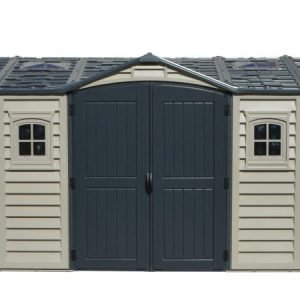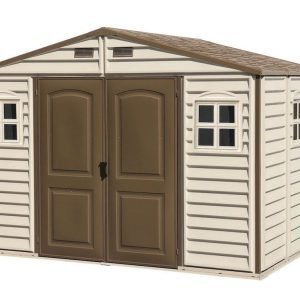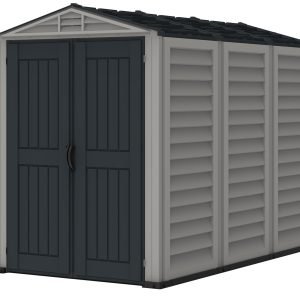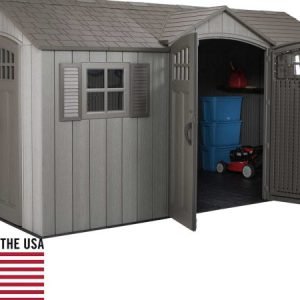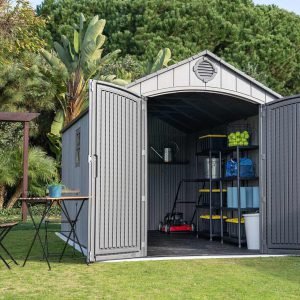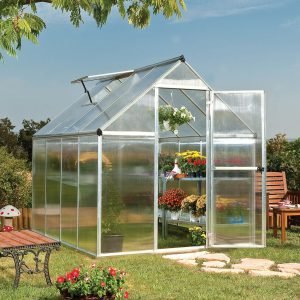Greenhouse Kits Store Australia & New Zealand.
Our Shop
Send us a message on WhatsApp for all your inquiries and questions you can solve your problems in a shorter time with direct chat.
Plastic Garden Sheds Australia and New Zealand
Bulk & Whole Sale Prices.
In recent years, plastic garden sheds have gained significant popularity in Australia and New Zealand. While traditionally, wood and metal dominated the market, plastic garden sheds are emerging as a preferred alternative for many homeowners and gardeners. This shift has been driven by several factors, including advances in plastic manufacturing technology, changes in lifestyle and gardening habits, and environmental concerns. This essay explores the reasons behind the growing adoption of plastic garden sheds in Australia and New Zealand, focusing on their practicality, affordability, durability, environmental implications, and cultural factors that have contributed to this trend.
Garden Sheds Australia For Sale
1. The Practicality of Plastic Garden Sheds
One of the primary reasons for the rise in popularity of plastic garden sheds is their practicality. In both Australia and New Zealand, people are increasingly drawn to the ease of installation, low maintenance, and versatility that plastic sheds offer. Unlike traditional wooden or metal sheds, plastic sheds require no painting, are resistant to rust, termites, and rot, and can withstand extreme weather conditions, making them suitable for a wide range of environments.
Australia’s harsh climate, characterized by hot summers, humidity, and occasional flooding in some regions, poses significant challenges to wood and metal structures. Wood tends to warp, rot, or attract termites, while metal sheds can corrode over time due to humidity and exposure to salt in coastal areas. Plastic sheds, on the other hand, are built from UV-resistant materials that can withstand sun exposure without fading or becoming brittle. They are also waterproof, ensuring protection of stored items even during heavy rainfall or flooding, which is particularly beneficial in areas prone to seasonal storms or tropical weather.
In New Zealand, which experiences a temperate maritime climate, plastic sheds also prove advantageous. The country’s frequent rainfall and cool winters can cause wood to decay and metal to rust, but plastic sheds, due to their water resistance and ability to tolerate temperature fluctuations, offer a more reliable solution. Additionally, plastic sheds are lightweight and easy to move, allowing homeowners to rearrange their outdoor spaces with ease, which is appealing to gardeners and DIY enthusiasts.
2. Affordability and Accessibility
Plastic garden sheds have become increasingly popular in Australia and New Zealand due to their affordability compared to wooden or metal alternatives. As housing costs rise and urbanization increases, many homeowners are looking for cost-effective solutions to expand their outdoor storage and workspace. Plastic sheds, typically priced lower than wood or metal structures, provide a more affordable option for people who may not want to invest heavily in a garden structure but still require the functionality of a shed.
The relatively low cost of plastic garden sheds is made possible by advances in manufacturing and material science. Plastics such as polyethylene and polypropylene, which are commonly used in shed construction, are produced at scale and offer a combination of strength, flexibility, and longevity at a reduced price point. These materials are also easier to mold and manufacture, enabling companies to produce plastic sheds in a variety of styles and sizes to suit different needs.
In addition to being cost-effective, plastic sheds are widely available across Australia and New Zealand. Large hardware chains and online retailers stock a wide range of plastic sheds, making it easy for consumers to purchase and assemble them. This accessibility is an important factor in their rise, as consumers value convenience when choosing products for their gardens.
3. Durability and Maintenance
Durability is a key factor that has contributed to the growing popularity of plastic garden sheds in Australia and New Zealand. As mentioned earlier, plastic sheds are highly resistant to weather conditions that would otherwise damage wood or metal structures. In regions of Australia that are prone to extreme temperatures, plastic sheds maintain their structural integrity, avoiding the warping and cracking that can affect wood. They also resist corrosion and rust, making them ideal for coastal areas where salt air can quickly degrade metal structures.
New Zealand, which experiences high levels of rainfall in certain areas, benefits from the water resistance of plastic sheds. The moisture-resistant properties of plastic ensure that the sheds remain free from mold and rot, problems that often plague wooden structures. Moreover, modern plastic sheds are engineered to be impact-resistant, meaning they can withstand accidental bumps, minor impacts, or even hailstorms, which are common in certain parts of Australia.
Maintenance is another critical advantage. Wooden sheds require regular treatment, painting, and repairs to ensure longevity, while metal sheds may need rust-proofing and other maintenance. In contrast, plastic sheds require minimal upkeep. A simple wash with soap and water is often enough to keep them in good condition, saving homeowners time and effort. This low-maintenance feature is particularly appealing to busy families or those who are not interested in regular upkeep but want a functional and durable storage solution.
4. Environmental Considerations
While plastic products are often criticized for their environmental impact, the growing popularity of plastic garden sheds in Australia and New Zealand also reflects a shift toward more sustainable forms of plastic use. Advances in recycling technology have made it possible for manufacturers to produce plastic sheds from recycled materials, reducing the demand for new plastic production and minimizing environmental impact. These recycled plastic sheds not only offer the same durability and practicality as new plastic but also help to reduce waste by repurposing materials that would otherwise end up in landfills.
Moreover, plastic sheds often have a longer lifespan than wooden alternatives, which contributes to their sustainability. Wood sheds, particularly those not constructed from treated timber, have a relatively short lifespan due to their susceptibility to rot, termites, and weather damage. Plastic sheds, on the other hand, can last decades without needing replacement. This longevity means fewer resources are required over time, as homeowners do not need to replace their sheds as frequently.
There are also arguments that the production of plastic sheds requires less energy and fewer natural resources than the production of wooden or metal sheds. The deforestation associated with wooden shed production and the energy-intensive processes involved in mining and refining metals make plastic a more sustainable choice in certain contexts. As awareness of environmental issues grows in both Australia and New Zealand, consumers are increasingly looking for products that align with their values of sustainability and reduced environmental impact.
### 5. Changing Lifestyles and Garden Trends
Lifestyle changes and evolving garden trends in Australia and New Zealand have also contributed to the rise of plastic garden sheds. With urbanization and the growing popularity of smaller homes and gardens, people are looking for more compact, efficient storage solutions. Plastic sheds, which are available in a wide range of sizes and designs, cater to this demand by offering space-saving storage options for tools, gardening supplies, outdoor furniture, and other items.
In both countries, there has been a growing interest in outdoor living spaces, and gardens are increasingly seen as extensions of the home. Homeowners are investing in creating aesthetically pleasing, functional outdoor areas where they can entertain, relax, and engage in hobbies like gardening. Plastic sheds, with their modern designs and customizable features, complement these spaces by providing a sleek, unobtrusive storage solution that blends well with contemporary garden designs.
Additionally, the rise of the DIY culture and a focus on home improvement has led to increased demand for easy-to-assemble garden structures. Plastic sheds are often sold as modular kits that can be quickly and easily assembled by homeowners without professional help. This DIY appeal has made plastic sheds an attractive option for people looking to create functional outdoor spaces without the need for extensive construction work.
The rise of plastic garden sheds in Australia and New Zealand can be attributed to a combination of factors, including practicality, affordability, durability, environmental considerations, and changing lifestyle trends. These sheds provide a low-maintenance, cost-effective, and long-lasting solution for homeowners looking to maximize their outdoor storage space. With advances in plastic technology and a growing focus on sustainability, plastic garden sheds have emerged as a viable and attractive alternative to traditional wood and metal sheds.
As gardening and outdoor living continue to play important roles in the lives of people in Australia and New Zealand, plastic garden sheds are likely to remain a popular choice, offering a blend of functionality, durability, and modern design that meets the needs of a diverse range of consumers. While there are ongoing concerns about the environmental impact of plastic, the use of recycled materials and the long lifespan of plastic sheds offer a more sustainable approach to outdoor storage solutions, making them a valuable addition to the evolving garden landscape in both countries.
Showing 1–20 of 22 results
Recently viewed items
Mythos Greenhouse
Time remaining until the end of the offer.


